|
|
|
Sort Order |
|
|
|
Items / Page
|
|
|
|
|
|
|
| Srl | Item |
| 1 |
ID:
007635
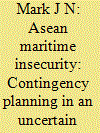

|
|
|
| 2 |
ID:
088137
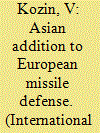

|
|
|
|
|
| Publication |
2009.
|
| Summary/Abstract |
THE GEORGE W. BUSH ADMINISTRATION, which has departed from the political arena, has left new President Barack Obama not only a host of unresolved regional problems, but also an array of issues concerning such a sensitive subject as arms control. The White House has effectively shelved such problem areas as further reduction of strategic offensive weapons (capabilities), tactical nuclear weapons, and control over five key types of conventional weapons in Europe, failing, together with its NATO partners, to ratify the well-known Treaty on Conventional Armed Forces in Europe (CFE).
Now Moscow and Washington will also have to deal with such a sensitive issue as the so called European missile shield - i.e., the deployment of U.S. strategic missile defense systems in Poland and the Czech Republic, planned by the previous Republican administration for deployment by 2011 - if established, they will account for around 25% of the U.S.'s entire strategic missile defense capability.
In this context, special attention also needs to be given to such a problem as the strategic and tactical missile defense system 1 that the United States has widely deployed and constantly upgrades in the Asia Pacific region - a system that has been left, as it were, outside the international debate due to the prominence given to Washington's plans to extend its "missile shield" to eastern Europe, closer to the Russian borders
|
|
|
|
|
|
|
|
|
|
|
|
|
|
|
|
| 3 |
ID:
129844


|
|
|
|
|
| Publication |
New Delhi, KW Publishers Pvt Ltd, 2014.
|
| Description |
vi, 231p.Hbk
|
| Standard Number |
9789383649129
|
|
|
|
|
|
|
|
|
|
|
|
Copies: C:1/I:0,R:0,Q:0
Circulation
| Accession# | Call# | Current Location | Status | Policy | Location |
| 057694 | 355.03305/PAT 057694 | Main | On Shelf | General | |
|
|
|
|
| 4 |
ID:
171000
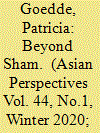

|
|
|
|
|
| Summary/Abstract |
The Constitution of the Democratic People's Republic of Korea is often dismissed as a valid legal instrument within the larger framework of the North Korean legal system. This is an unsurprising outcome given the portrayal of North Korea as a totalitarian dictatorship, documented human rights abuses, and the lack of access to the country's lawmaking processes. It is also a foreseeable result if comparisons are made to liberal democratic constitutions where rights guarantees and judicial review are defining elements. However, the North Korean Constitution deserves more nuanced scrutiny in light of evolving research on socialist and authoritarian constitutionalism in Asia. This article argues that the DPRK Constitution should be included more substantively within the analytical frameworks of Asian, socialist, and authoritarian constitutionalism by virtue of how it functions to nation-build, legitimate institutional leadership, signal ideological shifts, regulate society on collectivist, duty-based principles, and guide economic reforms for development and modernization.
|
|
|
|
|
|
|
|
|
|
|
|
|
|
|
|
| 5 |
ID:
091023
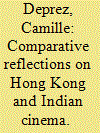

|
|
|
|
|
| Publication |
2009.
|
| Summary/Abstract |
Much research on contemporary Asian cinema is focused within national boundaries or takes an outright international approach, with few comparative studies. Historic and cinematographic similarities between Hong kong and India since the 1980s allow for a consideration of identity deconstruction and reconstruction in diaspora as seen in some of their films.The notion of vagueness becomes crucial to a nuanced view of the tendency either to withdraw into one's community or turn cosmopolitan.
|
|
|
|
|
|
|
|
|
|
|
|
|
|
|
|
| 6 |
ID:
184473
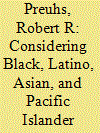

|
|
|
|
|
| Summary/Abstract |
Most of the literature on racial or ethnic groups’ foreign policy preferences focuses on parochial or diasporic interests to demonstrate group-specific influence in this policy realm. This situation leaves room for addressing the impact of African American, Latino and Asian American, and Pacific Islander (AAPI) racial/ethnic identities on individual-level preferences for broader, non-parochial, foreign policy issues and the degree to which multiracial preference coalitions (or agreement) emerge in a fashion reflective of domestic policy attitudes. Utilizing data on a range of contemporary foreign policy issues from the 2018 and 2019 Congressional Cooperative Election Studies (CCES), the analyses reveal that minority preference coalitions emerge across a wide range of foreign policy issues, a pattern that is most dramatic among Latino and Black Democrats. Moreover, these coalitions suggest minority moderation relative to white co-partisans from both parties.
|
|
|
|
|
|
|
|
|
|
|
|
|
|
|
|
| 7 |
ID:
123720
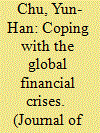

|
|
|
|
|
| Publication |
2013.
|
| Summary/Abstract |
Over the last two decades, Taiwan has weathered two global financial crises: the Asian financial crisis of 1997-1998 and the sub-prime loan crisis of 2008-2009. Each time the island's economy emerged from the crisis relatively unscathed. Many of the elements that constitute Taiwan's economic resilience have been fostered through entrenched institutional arrangements and established policy orientations over a long period. Taiwan managed to retain the bulk of these long-running sources of economic resilience despite the tremendous external pressures exerted by neo-liberal policy advocates to dismantle these 'out-dated' policy thinking and practices in the name of reform during the decade-long interval between the two crises. Taiwan was able to cope with the 2008-2009 global financial crisis thanks also to a more enabling regional environment created through stronger cooperation among Asian economies and under a new awakening among the East Asian policy makers.
|
|
|
|
|
|
|
|
|
|
|
|
|
|
|
|
| 8 |
ID:
095718
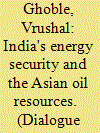

|
|
|
| 9 |
ID:
137815
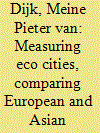

|
|
|
|
|
| Summary/Abstract |
Many cities have taken initiatives to achieve more sustainable development or to become ecological cities. In this paper, ten dimensions are suggested for defining ecological cities and an effort has been made to provide indicators to measure them. Many cities claim to be ecological cities, but there are no non-ambiguous definitions of ecological cities and few efforts have been made to measure to what extent the cities have achieved their goal. This paper considers the efforts of Beijing and Rotterdam to become more eco cities, using these dimensions. What can we learn from these experiences for developing the city of the future? In an illustrative effort to apply the suggested criteria, Rotterdam scored slightly better than Beijing. The latter city is facing more serious environmental problems and is willing to try more innovative solutions, while Rotterdam spends more money on prevention and CO2 reduction.
|
|
|
|
|
|
|
|
|
|
|
|
|
|
|
|
| 10 |
ID:
096182


|
|
|
| 11 |
ID:
132882
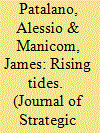

|
|
|
|
|
| Publication |
2014.
|
| Summary/Abstract |
In this issue of The Journal of Strategic Studies, we join the debate over the role that seapower plays in the current re-shaping of security relations in Northeast Asia and we aim to make three contributions to it. First, we argue that seapower matters because East Asia is a maritime region, one in which maritime forces are a primary tool underscoring both cooperative and competitive regional dynamics. Second, we suggest that claims of an emerging naval arms race in East Asia are not supported by the way the different regional countries are debating the pursuit of enhanced capabilities. In the region, there are certainly signs of capabilities procured with neighbouring actors in mind, but these procurement plans are only a fraction of much more complex and articulated policies that have to do with the wider evolving strategic meaning that the sea has for each of the nation states under examination. The third contribution of this issue concerns the realm of methodology. Over the past decade and a half, a number of new source materials emerged in China, Japan, and the Republic of Korea (ROK) that enabled scholars with language expertise to engage in greater depth in the study of defence policy and military modernisation in East Asia. The articles in this issue aim to showcase how different methodologies, ranging from contemporary history to political science, can be applied to articulate nuanced analysis.
|
|
|
|
|
|
|
|
|
|
|
|
|
|
|
|
| 12 |
ID:
097129
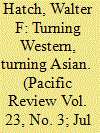

|
|
|
|
|
| Publication |
2010.
|
| Summary/Abstract |
Cultural analysis, an increasingly popular approach, contributes to our understanding of comparative and global politics by drawing needed attention to non-material factors. In some forms, however, this approach may also strip political actors of agency, treating norms and ideas as external, independent and determinative. Gramsci offers a useful corrective, highlighting the elusive link between material and non-material factors. I invoke Gramscian analysis to explain the otherwise confounding volatility in Japanese norms of identity, norms that over the past 150 years have appeared to flip-flop between "Western" and "Asian" poles. This case study reveals that dominant forces in Japan have used these competing social constructs to consolidate their hegemony or advance their particular interests at different historical moments.
|
|
|
|
|
|
|
|
|
|
|
|
|
|
|
|
| 13 |
ID:
141085
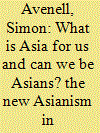

|
|
|
|
|
| Summary/Abstract |
This paper traces the development of the ‘New Asianism’ in Japan over the past quarter of a century. It identifies three broad trajectories or normative positions in the debate: those advocating the replication of a Japanese model in Asia, those in favour of a genuine community of equals, and those who see Asia as the only future for Japan and as a solution for the country's economic and social problems. The paper argues that the evolution and shifting prominence of each trajectory over time is indicative of the ways globalization and regionalization are impinging on imaginations of the nation and facilitating novel perspectives on East Asia in Japan. Although the nation-state is, and will probably remain, an important force behind Japan's relations in Asia for the foreseeable future, the New Asianism may be indicative of its gradual relativization and the beginning of a new, more multidimensional understanding of Asia in Japan.
|
|
|
|
|
|
|
|
|
|
|
|
|
|
|
|
|
|
|
|
|